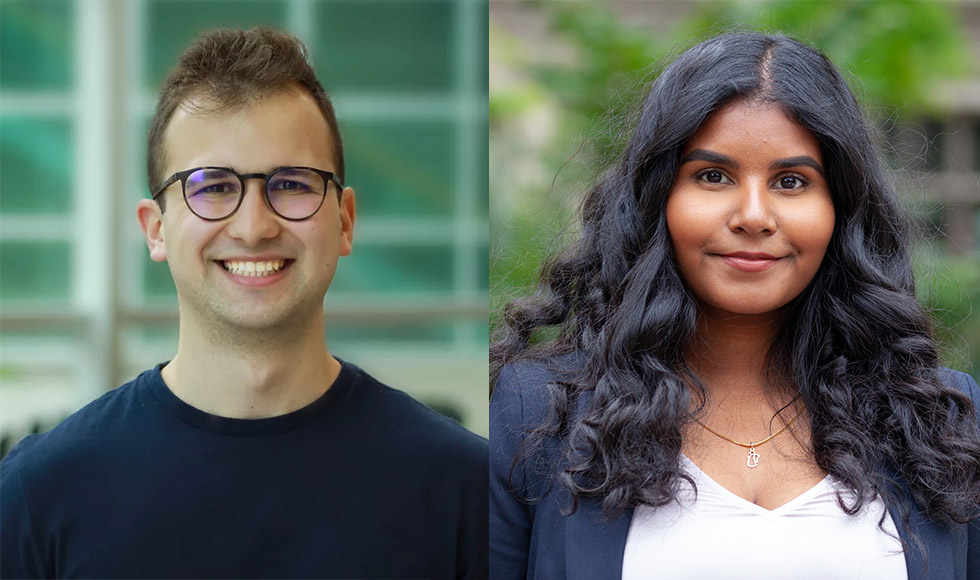McMaster’s new pandemic research awards give undergrads experiential research opportunities

Andrei Bogza and Manousha Dhiwaghar are the inaugural recipients of the new Robert Alan Kennedy Global Nexus Research Excellence Awards. The awards are part of a broader university strategy to give students new experiential research opportunities during the summer practicum.
BY Blake Dillon
November 9, 2022
What do democracy and drug resistance have in common?
They may seem worlds apart, but, during a pandemic, both are vital aspects of a public health response.
That’s why Canada’s Global Nexus for Pandemics and Biological Threats has awarded $7,500 to two undergraduate students to conduct research into pandemic preparedness. The inaugural recipients of the new Robert Alan Kennedy Global Nexus Research Excellence Awards, Manousha Dhiwaghar (Anthropology) and Andrei Bogza (Biomedical Discovery & Commercialization), are using the funding to explore pandemics from different perspectives.
These new awards, established through the philanthropy of McMaster alumnus Robert Alan Kennedy, are part of a broader university strategy to give students new experiential research opportunities during the summer practicum.
Under the mentorship of Humanities assistant professor Alpha Abebe, Dhiwaghar is using her award to investigate how the principles of democracy have been impacted by the COVID-19 pandemic. This means exploring how the pandemic re-shaped notions of protest, polarity, politics, liberty, conspiracy and so much more.
“This work will eventually lead to an understanding of how social and political identities framed and influenced the pandemic in Canada,” said Dhiwaghar.
Bogza, meanwhile, has been working with Biochemistry & Biomedical Sciences professor and chair Brian Coombes to understand how bacterial pathogens — Salmonella in particular — resist natural immune responses. This research may lead to new paradigms in antimicrobial treatment in the age of antibiotic resistance — what some McMaster experts argue is ‘the next pandemic.’
“My research involves designing a system for taking images and video of human immune cells being infected by Salmonella to determine how a lack of defence affects infection progression,” Bogza explained.
This work, Bogza notes, is unique in that it focuses on observable traits — or phenotypes — instead of proteins and other molecules, as is standard in host-pathogen research.
In addition to broadly furthering interdisciplinary research into pandemic prevention and response, both Dhiwaghar and Bogza agree that the awards are an important way for undergraduate students to gain early momentum in their own research careers.
“The opportunities that this award has enabled have solidified my passion for microbiology,” said Bogza, who now hopes to continue his research into grad school.
For Dhiwaghar, who likewise intends to continue her studies and one day earn a PhD in political anthropology, the award has taught her research fundamentals, afforded her important mentorship and left her feeling “very capable and independent.”
Applications for the next cohort of Robert Alan Kennedy Global Nexus Research Excellence Awardees will be accepted this winter.
A world-leading innovation hub
Global Nexus aspires to become a world-leading innovation hub where research, learning and community come together in new ways to ensure the world is better prepared for future pandemics and biological threats. It will serve as a beacon for evidence-based, community-informed solutions that prevent the kind of catastrophic impacts and avoidable deaths caused by the COVID-19 pandemic.


